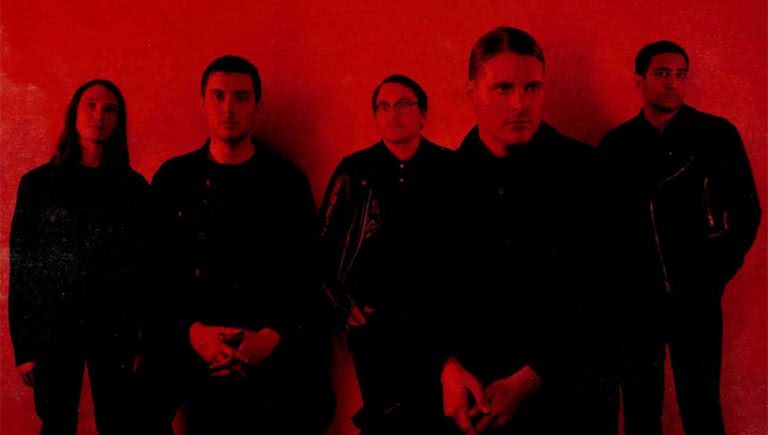Deafheaven have always been a difficult band to categorise. Combining the ferocity of black metal with the ambient and melodic textures of shoegaze and post-metal, while not the first to blend the genres, they’re arguably the most well known.
The release of second studio album Sunbather in 2013 was the band’s first major moment in the sun, garnering widespread critical and commercial acclaim.
It also proved divisive – as lauded by the fans and critics for pushing the boundaries as it was decried by metal purists unable to accept a band as diverse as Deafheaven, certainly not after achieving mainstream success with a type of music that prides itself on obscurity.
Half a decade later and, on new album Ordinary Corrupt Human Love, the band feel more confident and self-assured than ever before. Where previous work was the product of tension and frantic energy, Ordinary takes its time while maintaining the band’s signature intensity.
With an Australian tour imminent including a slot on this year’s Farmer & The Owl festival, we spoke to the band’s frontman George Clarke.
Watch the clip for ‘Honeycomb’ by Deafheaven below:

The album came out in July, I’m curious what it’s been like experiencing it in the live context?
George Clarke: I’ve really enjoyed it. The whole band has. I think that these songs really come alive in a live setting. The way they were written was a bit more organic so I think they process that way in a live situation. They’ve made playing really fun, and I think they work really well with the rest of the setlist.
You’ve worked with Jack Shirley for every album including Ordinary, I’m curious about what the relationship is like there that makes it work?
Jack is a guy we’ve known a long time. Jack kind of took a chance on us, was willing to work with us when we had no money and were in pretty bad shape.
We got his vote of confidence really early on and from there our relationship has just grown not only professionally but personally also, he’s a good friend and he understands the band and what we’re trying to do, who we are.
He’s extremely laid back and helpful. It’s always just a really nice experience recording with him, and it always makes sense, so we just keep going back.
The album has a real confidence and belief in itself, it sounds very freeing. Did it feel that way for you?
Absolutely, you hit the nail on the head. That’s very much how we were feeling. Especially in comparison to New Bermuda, which was very urgent and aggressive, I think in those moments of frenzy it comes off a little more confident than it is. Whereas, with this record, I think that we were just feeling really good about what we were making.
Listen to ‘Canary Yellow’ by Deafheaven below:

I’m curious how that carried over into when you were writing lyrics and the things you chose to write about?
The lyrics tend to do what we do a lot, which is kind of write both sides. I think there’s still a lot of drama and sadness on this record, certainly, but it was nice that it didn’t have wholly to do with me. I wrote a lot about things that I saw, or experiences of other people, and so in that way Ordinary is different. It was a lyrical departure which was very welcomed, honestly.
When Sunbather came out I feel like there was this nagging criticism where people perceived it to be insincere, when to me there’s always been a level of honesty and vulnerability with what you do.
That’s the intention. Kerry and I have always said one of the main objectives and one thing we’d never stopped doing is being very honest, and being vulnerable. The music and content is intended to be as honest as possible and it wouldn’t feel worth it to me if that wasn’t the case.
It’s funny that you mention Sunbather, we always kind of said the same thing. It was like we were just being punished for keeping it real.
You’ve talked in the past about the period after Sunbather came out, and not having time in between Sunbather and New Bermuda and it maybe being a kind of intense and difficult period. I’m curious if there’s been a shift that’s made it a more sustainable thing?
For one, we took our time. Following Sunbather we were really scared. No one expected this record to do as well as it did, and we signed with a new label, and it felt like a lot of our eyes were on us, and we just wanted to put something out as quickly as possible.
We probably hadn’t given our creative brains enough time to really rejuvenate, and this time we did. We got more focused, we kind of came to a crosswords – if we want to continue doing this, and it is becoming a career at this point, we need to take it more seriously.
We slowed down, and stopped going out as much. Stopped getting into the other side of things as much, the partying. We took a breath, and all those little things made the writing and recording a lot more enjoyable and just more doable. We’d been taking the hardest road to get there for no reason, and we decided to stop doing that.
Ordinary Corrupt Human Love is out now. Deafheaven kick off an Australian tour next month – you can find details here.




































